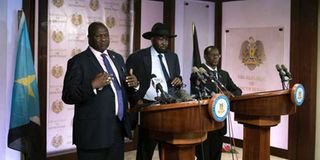Even abroad, South Sudan's people remain suspicious of each other

South Sudan's First Vice President, Riek Machar, (left) delivers a speech to journalists next to President Salva Kiir (centre) and Vice President James Wani Igga (right) prior to the shooting outside the presidential palace in Juba on July 8, 2016. AFP PHOTO | CHARLES ALIKI LOMODONG
What you need to know:
- The Times article was immediately disavowed by Machar, who argued he had not been consulted for its contents.
- Morgan was referring to an incident in Nakuru in which church leaders from South Sudan quarrelled in public over who should take over.
- The rebels allied to Machar say the South Sudanese embassy in Nairobi did not recognise them and would not offer services to those who show up before it.
South Sudan should have been celebrating its fifth independence anniversary last weekend with an exemplary military parade in Juba.
Instead, the birthday of the world’s youngest nation is being marked with renewed fighting, pitting soldiers allied to President Salva Kiir against former rebels supporting First Vice-President Riek Machar. That means the government is fighting itself, imploding.
South Sudan seems to be developing a history of false hope. Just two years after independence, fighting broke out in 2013 when an attempted coup by soldiers allied to Machar caused the country long suffering
That conflict was resolved only recently, when Machar agreed to return to Juba in April to take up the post of First Vice-President under the peace agreement the two signed last year.
On the international stage, Machar and Kiir have often paraded renewed hope. They agreed to form a transitional government, albeit under pressure.
They have expressed commitment to stabilise the country, and even supported the country’s admission to the East African Community.
In June, the New York Times published an opinion piece asserting what the country needs to heal its long-time tribal wounds. However, it turns out this public relations thing was only skin-deep.
OPPOSITE SIDES
The Times article was immediately disavowed by Machar, who argued he had not been consulted for its contents.
The differences between Kiir and Machar go beyond public relations. They have different levels of education, for example. Machar is highly educated, with a PhD in Strategic Planning from the University of Bradford. Kiir’s education is more moderate and he spent many of his early years fighting for rebels against the government in Khartoum.
The two belong to different tribes, the most important classification in the South Sudan conflict. Before and after South Sudan was created, the Dinka (Kiir’s tribe) and Nuer (Machar’s tribe) have often played on opposite sides.
The Dinka formed the early rebel movements that fought Khartoum till independence, and when they won, they took up most of the posts in the government and military. The Nuer on the other hand, were chance-takers. At one time, Machar sided with Khartoum, and at another, he sided with the rebels under the late John Garang.
After independence, those differences have persisted. More than two months since the transitional government was formed in April, South Sudan’s war factions continue to play out their differences in Kenya.
Though the deal was meant to form a transitional government composed of members from both sides, the current situation is such that each faction has its own representation in Nairobi.
PARALLEL OFFICES
The Kenyan government recognises the rebel office as a humanitarian agency, rather than a diplomatic outpost. There also exists the South Sudanese embassy, which should essentially serve all people from that country.
The rebels allied to Machar say the South Sudanese embassy in Nairobi did not recognise them and would not offer services to those who show up before it.
“We formed an office with [the] understanding that we don’t fall under the then government. They didn’t recognise us and you would often be told that you are a rebel whenever you need assistance,” James Gatdet Dak, a spokesman for Machar argued in an earlier interview.
That was before Machar took over. So why do they still continue to run the office in Nairobi parallel to the embassy? Dak told the Nation on Saturday the office will be “merged with the embassy.”
That is probably after the transitional government has run its 30-month period.
“The office basically deals with assisting our people with humanitarian needs, such as when they run out of money to renew their visa are arrested by the police or lose passports,” he added.
STREET FIGHTS
James P. Morgan, who has been the deputy head of mission in Nairobi until recently, agreed divisions exist among his people, often manifesting in street fights abroad.
“South Sudanese people often fight those people they know because our people are still divided. So more often, those bar brawls or church conflicts are among themselves,” he argued.
Morgan was referring to an incident in Nakuru in which church leaders from South Sudan quarrelled in public over who should take over.
The incident turned ugly, with fist fights, forcing the embassy to intervene and save the church from public embarrassment. “We did help them resolve their differences. And I have not heard it again since 2013.”
But in November 2014, 20 people were killed at the Kakuma refugee camp after groups from different ethnic South Sudanese refugees fought. The UN refugee agency (UNHCR) downplayed the incident at the time, but the refugees had isolated themselves into separate tribal camps.
To date, the embassy struggles with a delicate balancing act. On one hand, it says it is open to serving all South Sudanese people, but deep-seated suspicions prevent those allied to the rebels from seeking consular assistance.
“It is our role to ensure that our people living here stay within the law. It is true some of them do not bother to renew their visas, for example and they often find themselves on the wrong side of the law,” a spokesperson said. “Here, we come in to help them get the right papers.”





